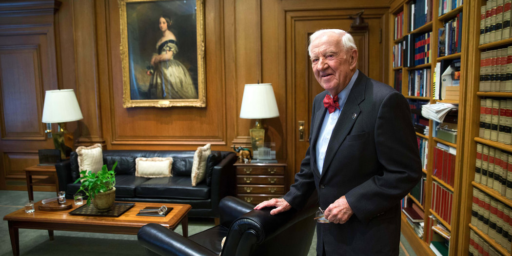More on Palin and Earmarks (Updated)
It appears that while Sarah Palin was busy hiring lobbyists to get Congress to provide earmarks to the small town of Wasilla, John McCain was fighting her earmarks.
For much of his long career in Washington, John McCain has been throwing darts at the special spending system known as earmarking, through which powerful members of Congress can deliver federal cash for pet projects back home with little or no public scrutiny. He’s even gone so far as to publish “pork lists” detailing these financial favors.
Three times in recent years, McCain’s catalogs of “objectionable” spending have included earmarks for this small Alaska town, requested by its mayor at the time — Sarah Palin.
[…]
In 2001, McCain’s list of spending that had been approved without the normal budget scrutiny included a $500,000 earmark for a public transportation project in Wasilla. The Arizona senator targeted $1 million in a 2002 spending bill for an emergency communications center in town — one that local law enforcement has said is redundant and creates confusion.
McCain also criticized $450,000 set aside for an agricultural processing facility in Wasilla that was requested during Palin’s tenure as mayor and cleared Congress soon after she left office in 2002.
Look, I don’t have a problem if a presidential candidate and his/her running mate have different positions on some issues, either on paper or on the record. Candidates can disagree with each other, and that’s fine.
But, if the McCain campaign insists on touting Sarah Palin as a “reformer” and an “earmark opponent”, then they are being deliberately misleading, and both McCain and Palin’s records reflect that.
Taylor Griffin, a McCain campaign spokesman, said that when Palin became mayor in 1996, “she faced a system that was broken. Small towns like Wasilla in Alaska depended on earmarks to take care of basic needs. . . . That was something that Gov. Palin was alarmed about and was one of the formative experiences that led her toward the reform-oriented stance that she has taken as her career has progressed.”
Palin, he said, was “disgusted” that small towns like hers were dependent on earmarks.
Public records paint a different picture:
Wasilla had received few if any earmarks before Palin became mayor. She actively sought federal funds — a campaign that began to pay off only after she hired a lobbyist with close ties to Sen. Ted Stevens (R-Alaska), who long controlled federal spending as chairman of the Senate Appropriations Committee. He made funneling money to Alaska his hallmark.
Steven Silver was a former chief of staff for Stevens. After he was hired, Wasilla obtained funding for several projects in 2002, including an additional $600,000 in transportation funding.
I don’t think that Sarah Palin is corrupt, the way Stevens is. She was a whistleblower and did her part to fight some of the endemic corruption in Alaska. No questions there.
But the reality is that she has done very little to change the causes of those problems in Alaska. Namely, the state government’s dependence on oil companies (which she exacerbated by promoting drilling over alternative energy and by enacting windfall profit taxes) and dependence on federal pork barrel spending (which she has eagerly pursued throughout her career). This is problematic because the McCain campaign is saying that she’s good choice because she did change those things–when in fact she did nothing of the sort.
UPDATE: My colleague Steve Verdon in the comments assures me that Palin’s tax hikes on oil companies are not properly characterized as “windfall profit taxes” but rather increases in severance taxes. My mistake–I was relying on the characterization provided in the articles I’ve read on the subject. I still, however, think that reliance on oil revenues is at the heart of Alaska’s issues with corruption, and I don’t think that increasing taxes and thereby increasing the state government’s reliance on oil companies addresses the root of Alaska’s problems.






I know it can be hard to believe, but focusing the most powerful magnifying glasses available on these relative gnats — which may be exactly as you say — doesn’t mean Governor Palin isn’t a reformer, unless you are willing to examine her entire record and weigh the results. The perfect remains the enemy of the good and there are certainly no perect people in politics.
Careful Alex, your partisanship is showing. This reminds me of nothing more than your inability to let go of one verbal slip by John McCain regarding Sunni and Shia in Iraq. Still missing the forest for the trees, or is it the twigs?
Charles,
Pray tell, what, in Palin’s record, makes her “on balance” a reformer? I’m not saying she’s done nothing good. I’m saying that she’s pro-earmark and has increased Alaska’s dependence on oil, which are at the heart of the Alaskan government’s issues. What has Palin done to stand up to either?
As for the Sunni-Sh’ite slip, had McCain done it once I would not have minded. That he has done it on several occasions is worrisome.
Give me a break. This type of sexism has no place in political debates.
If it had been a man who had used his office to get his estranged brother-in-law fired and tried to ban books in the Wasilla library, you would never be undertaking this analysis.
I don’t expect you to believe me oe perhaps even yourself (She was a whistleblower and did her part to fight some of the endemic corruption in Alaska. No questions there.), so here’s the Wall Street Journal on this topic.
I can understand perfectly well how a mayor of a small town would seek funds to meet the needs of their citizens wherever they can find them, and how that same person in a more responsible position might later find some of those same funding sources somewhat less appealing. By all accounts, it was Governor Palin’s experiences on the Oil and Gas Conservation Commission that made her into a reformer and led her to unseat Goivernor Murkowski.
Your note about Alaskan’s needing alternative sources of energy is, well, wierd. Projection of lower 48 needs would seem to be unwarranted in this case. Anyway, exactly how much in non-oil exports do you imagine Alaska can generate for its people? Not everyone can be a crab fisherman, you know.
What Charles said.
You wear different hats depending on which job you’re doing. As mayor–and even governor–you’re playing a zero-sum game. If you don’t grab the freebies while they’re being handed out, someone else will, to the cost and detriment of your supporters.
As a congressional rep, either in the house but particularly in the senate, you should be bearing more broadly focused attention, looking at the national welfare.
In the White House, as Pres. or VP, the focus should be entirely on the national level.
I think you’re stretching this too far Alex. In another thread it was clearly explained how a politician can be against earmarks while still accepting them. John Burgess and Charles Austin explain it again here. This is a non-issue except to partisans looking for a chink in the armor.
In many case earmarks are nothing more than a prioritizing of federal spending. Public transportation facility before road maintenance perhaps?
On the whole we have a reformer who fights corruption.
What….Palin favored a windfall profits tax on oil companies? Really?
Time to fire up google…
Steve,
I don’t have a problem with earmarks per se. But John McCain does. So what I do have a problem with is John McCain touting Sarah Palin as an “anti-earmark reformer” when Sarah Palin has spent her ENTIRE POLITICAL CAREER going OUT OF HER WAY to get earmarks by hiring a lobbyist for her town which had never received federal earmarks before. I also have a problem with this characterization because as noted above, John McCain himself has cited Palin’s earmarks as examples of wasteful spending that he opposes.
John,
As mentioned, Palin didn’t take earmarks offered, she WENT AFTER THEM. There’s a difference.
Charles,
Then why did she continue to aggressively pursue earmarks as Governor? Including the infamous “Bridge to Nowhere”? Why did she actively seek out Ted Stevens’ assistance in obtaining earmarks?
Hey, don’t blame me–Sarah Palin is the one who said while campaigning for governor that alternative energy is essential for Alaska, and then vetoed every alternative energy project that came across her desk. (With one exception–she vetoed the Fire Island wind farm in 2007, but let it through when it came up again in 2008.)
Just because someone is called a reformer doesn’t mean they actually are one. She has definitely fought some corruption but she has not done anything to address the fundamental, root causes of the incentives for corruption in Alaska.
Steve Verdon,
Favored it, passed it. Complete with “energy rebate.”
http://seattletimes.nwsource.com/html/localnews/2008103325_alaskatax07.html
Hmmm, that is what most blogs/newspapers are saying, but Beldar says no.
Based on the description of the tax, I’d say calling it a windfall profits tax is a bit misleading.
Care to update?
Steve,
Call it what you want–she hiked the taxes, based it on the price of oil, put a floor on it (so if oil prices dropped below a certain threshhold, the tax revenue would not go down but rather remain as though the price of oil was still at that level), and used the revenue to provide an “energy rebate.” I don’t know whether “windfall profits” is a technical term–I always assumed it was vernacular.
The fact remains, though, that she raised the currently existing taxes and tied it to the price of oil. The tax hikes were big enough that several oil companies cancelled some extraction projects because the tax meant that they were no longer cost effective.
Article on Utah’s “Windfall” Severance Tax.
Louisana’s severance tax.
Alex,
Now who is being…misleading?
Yes, she renegotiated the severance tax. Yes she built in a progressivity factor. But this is typical of what all states do and isn’t merely a result of the profitability of an industry, but because they are taking something that belongs to the state and hence to all the people of that state. Alaska has always had a severance tax. In fact, Palin made the process public where before it was done behind closed doors.
Well no duh. So is Louisanas, it is based on the value at time of severance. That is typical. A windfall profits tax basically says, “You are making more money that we think is right so we are going to tax it away.” This tax does not work that way. The basis for this tax is, “You are extracting valuable resources that belong to the State and hence to all residents of the State and selling them for a profit, likely out of state, so we are going to charge you.” The rationale’s behind the two taxes are different.
Finally, it is considered a type of “ecotax”. Funny that the Democrats, liberals, and enviros should be so up in arms.
I strongly urge you to update.
Are all the the oil fields on state property? If not, how do the resources “belong to the state”? Some must be on federal or private land. Is the tax in question only on oil extracted via leases on state owned lands?
Sarah Palin’s actions and words are more, dare I say it, nuanced with respect to the “Bridge to Nowhere” than you allow for Alex. From CNN:
I think you are not giving her near enough, aw heck, no credit for opposing the likes of Murkowski, Young and Stevens. Altogether she seems like a politician right out of central casting to me, albeit one that did ultimately kill the project when she had the authority to do so. I know I sound like a broken record but she did good here. Maybe not perfect, but good.
Nice try, Alex. Good honest work, Steven.
The tax applies only to oil removed from State owned land, not privately owned land. At least I haven’t seen anything saying it applies to all oil produced in the state.
This is a tax that has always been there. Taxes like this are common in most states if not all. Yes, she renegotiated it, but this time around she made it more public and transparent–or to use Beldar’s words she brought sunshine to the process. How is this bad.
Yet another interesting point. Dunderheads like Kevin Drum, who is pushing this “windfall profits tax meme” is usually four-square behind progressivity in a tax code. But now…why look it is something to be held up as a bad thing…when the person doing it is a Republican.
Here you go anjin-san.
That is a DoE report on the North Slope of Alaska. If you search on severance you find the following text,
Steve Verdon,
Thanks for the info. I’m going to need to dig into this deeper, but I’ll probably end up doing a separate post about it. I still think it’s problematic for Alaska to increase its revenue dependency on the oil companies, though.
RW,
If you’ll note the article I mentioned to Steve, it labeled this a “windfall profits tax.” I took the article at its word. How is that dishonest?
Charles,
Murkowski, definitely. Credit where credit is due. Don’t know enough about her dealings with Young yet, but I’m looking into it.. As far as Stevens goes, he campaigned with her for governor and endorsed her. She ran a pro-Stevens 527 group, and she relied on him to bring earmarks into the state when she was governor. Her anti-Stevens bona fides don’t seem to be there.
So far, Palin seems like a capable enough politician. Just not a “reformer” in the McCain mode.
Maybe so, but at the same time I don’t think it is unreasonable for a State to want recompense for the loss of valuable non-renewable resources.
Also, if you look at Palin’s press release archive as governor you’ll find one where she praises parts of Obama’s energy policy, but specifically poo-poo’s a national windfall profits tax.
And lastly, this is indeed a tax on profits…but then so are corporate profit taxes. And for any State if the corporations in that state increase their profits the revenues from corporate profits also increase. I don’t think anyone would call corporat profits tax windfall profits tax. Because if so, then there is no need for a seperate windfall profits tax as all companies already pay corporate profit taxes.
And as a general disclaimer: I don’t particularly like Palin. I don’t like her idea of teaching creationism side-by-side with evolution. I don’t care for her stance on abortion. While her views on the Drug War are more progressive than most conservatives of her type, I still find them bad. I’m not defending her because of any party loyalty or other nonsense. I just don’t think it is right to call this a windfall profits tax.
Steve,
Thanks for the info. On the surface, it does not seem unreasonable for the state to derive additional revenue from oil extracted from state owned lands based on increases in oil prices.
On another tack regarding Palin, there are reports that her newly hired lawyer is now stonewalling the state investigation that she was supposedly eager to cooperate with.
Oooo, another “some say…”
Yes, well, there were reports that Trig was really her daughter’s baby too. Seriousness of the charge, don’t ya know? But hey, keep digging and slinging any feces you can find hoping it will stick.
This tactic is abominable and you might want to think about the bad karma you’re accruing.
Talking Points Memo (my source) is as credible as any political blog out there. Josh Marshall has a Polk Award for Journalism. The link won’t clear James’ spam filter, but just put “Talking Points Memo” into Google. It should take 5 seconds to have the complete article in front of you.
But hey, keep up with the “poop” lines charles, its at least as interesting as anything else you have to say.
Palin Wants Independent Trooper-Gate Probe Called Off
By Zachary Roth – September 3, 2008, 10:09AM
In the latest sign that Sarah Palin’s promised cooperation with the Trooper-Gate investigation is failing to materialize, her lawyer is now demanding that the entire case be taken out of the hands of the independent prosecutor hired by Alaska lawmakers, and given over to a state personnel board — whose three members were appointed by the governor herself.
Who said political blogs were credible sources? I’m familiar with TPM, color me unimpressed with Mr. Marshall’s hack politics. But isn’t the wallpaper in the echo chamber luxurious.
Well Charles, the fact that you are unimpressed with Marshall will probably cause him to sleep better tonight. He is an award winning journalist and you are pretty much of a fringe ranter. As for political blogs being reliable sources, they are like a lot of sources, some reliable, some not. TPM is probably in the top 5% in terms of reliability.
Besides, if I was looking for an echo chamber, why would I be here? Try and think things through a bit more…
Alex,
One factor you and almost everyone else is missing in this discussion is that the federal government owns a massive percentage of the land in Alaska. This has a significant impact on the ability of the state to raise revenue because the federal government does not pay taxes on those lands.
The practice of federal moneys going to a state like alaska are not automatically acceptable.
However, the acceptability federal money going to alaska needs to be evaluated
1. Based on what it is being used for
2. Balanced against the fact that the federal government owns massive amounts of land that can’t be used in economically productive ways.
Additionally the fact that the government has a lot of activity in alaska (military activity and land holdings) is going to skew alaska’s consumption of federal dollars higher.
The seniority of the republican congressional delegation from alaska is going to skew it a lot higher.
Alex,
Severance taxes apply to a lot of things not just oil and gas.
For example, here is a link that gives the tax rates for timber in Louisiana
Severance tax rates set on 2001 stumpage
Here is a link to some of the actions the state of texas gives severance tax credits for
Texas Severance Tax Incentives
Tax law can be complicated but it is not accurate to call a severance tax a windfall profits tax.
This is another inaccurate meme started by partisan hacks. You are not a partisan hack but the folks on the blogs and in the media who got the the misinformation circulating for you to come across it are partisan hacks.
Alex,
You said,
Could you provide more information on the projects she vetoed?
It could have been an absolutely correct decision to veto the projects based on technical, ecological, or economic reasons.
It is impossible to evaluate the correctness of the vetos without that information and my first instinct is to assume they were good vetos absent contrary information.
Alex, I did not call you dishonest. I’m sorry you thought I did. Not that it really matters or makes any difference to you, your posts generally strike me as having too much of a partisan tone for my taste, so I generally don’t pay all that much attention to them. This particular subject just happened to catch my eye because, as it happens, I’d recently done some research on the subject for other reasons. (I’m no expert, and I don’t play one on TV.) With that in mind, Steve’s presentation struck me as being pleasantly devoid of partisanship, so I complimented him. On reflection, given the misunderstanding, a better term probably would have been “non-partisan.”
I doubt I’ve posted 10 comments here in all the years James has hosted Outside the Beltway. In fact, I usually don’t bother reading the comments. With the predictable, loud, repetitive, and disruptive antics of two regulars here in particular, it’s just not worth the aggravation to me. (That doesn’t mean I advocate banning them or anything like that. I just find them sufficiently repulsive to me to not make the effort to wade through or by them.) I see it’s too late to give you the short version, I’ve undoubtedly provided you too much information in response, and ticked off any number of people along the way, but that’s the way life is sometimes.
P.S. Alex – If you absolutely must repeat talking points, save yourself some embarrassment and spend a few seconds checking into them before you post them. I see you brought up the now-infamous 527 committee Palin supposedly “ran.” (She didn’t run it, BTW, she was one of several “directors.”) Do you have any idea how much money they raised, Alex? How much money they spent? Well, Alex the amount raised was Zero dollars (as in $0.00) and the amount spent was Zero dollars ($0.00). Some scandal.
Alex,
You said
There is a lot of magical thinking about alternative energy and the economic benefits it may or may not provide.
It is impossible to evaluate the assertion that promoting drilling over alternative energy hurt alaska’s economy without some actual evidence.
We do have evidence from Europe that alternative energy is not any sort of an economic driver.
Congress’s Energy Debate
People need to remember the perfect is the enemy of the good.
Palin may not be perfect but she is one of the rare politicians who has actually taken some steps to try and be more responsible with government spending.
Her policies have not been perfect but with very few exceptions (Jeff Flake, Tom Coburn, etc) they have been vastly superior to what other politicians have done in similar situations.
I find it interesting that Palin is getting flack for not doing more especially when one considers the fact that the vast majority of politicians have done nothing or worse.